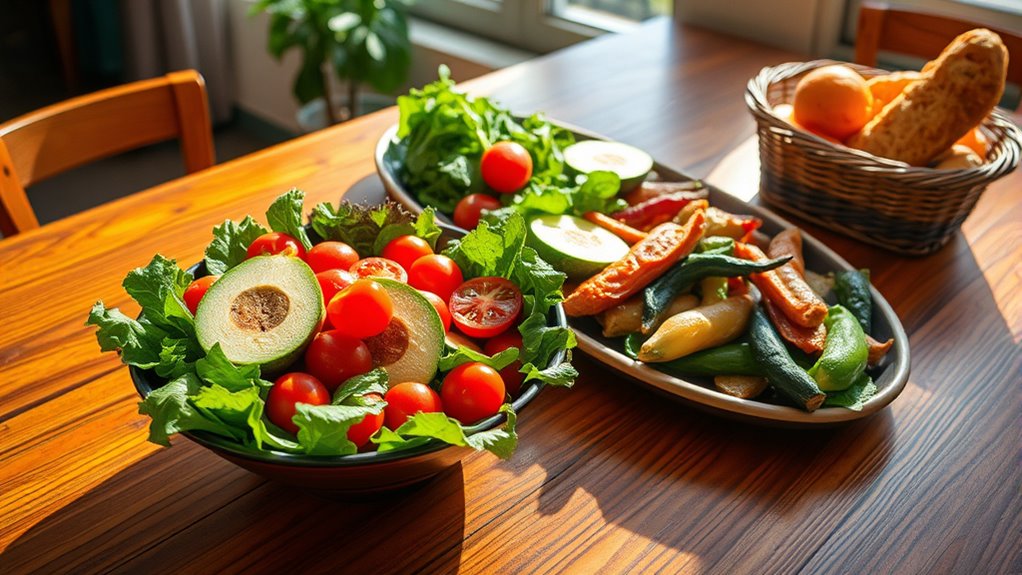To eat more plants and less meat easily, swap out ground beef for beans or lentils in your favorite recipes. Incorporate plant-based proteins like tofu, chickpeas, and quinoa into meals, and top oatmeal or smoothies with nuts and seeds for extra nutrients. Explore diverse cuisines and shop at farmers’ markets for fresh, seasonal produce. Continuing this approach can boost your health and help protect the environment—discover more simple tips ahead.
Key Takeaways
- Replace meat with plant-based proteins like beans, lentils, and tofu in your favorite recipes.
- Incorporate a variety of vegetables, grains, nuts, and seeds into daily meals for added flavor and nutrients.
- Plan meals around plant ingredients and try new cuisines like Middle Eastern or Asian for diversity.
- Use simple swaps such as chickpea curry instead of chicken or veggie stir-fries instead of beef.
- Shop at farmers’ markets and choose organic, seasonal produce to make plant-rich eating easy and sustainable.

A plant-rich diet offers a powerful way to improve your health, support sustainable living, and enjoy a wide variety of delicious foods. By focusing on incorporating more plant-based proteins into your meals, you can reduce your reliance on meat while still getting the nutrition your body needs. Plant-based proteins, such as beans, lentils, tofu, tempeh, and quinoa, provide essential amino acids and can be just as satisfying as animal products. These options not only help diversify your diet but also contribute to a more sustainable way of eating. When you choose plant-based proteins, you’re supporting sustainable farming practices that use fewer resources, generate less pollution, and promote healthier soil. This shift benefits the environment and aligns with your desire to make more eco-friendly choices.
To start eating more plants, consider swapping out some of your usual meat-based meals with hearty vegetarian or vegan dishes. For instance, replace ground beef in tacos with black beans or lentils, or try a chickpea curry instead of chicken curry. These swaps are easy to make and can be just as flavorful. Incorporate more plant-based proteins into your breakfast by adding nut butters or chia seeds to smoothies, or enjoy oatmeal topped with nuts and seeds for added protein. Planning your meals around plant foods ensures you consistently include these nutritious options, making it more natural to eat less meat over time.
Another simple way to increase your intake of plants is by exploring new recipes and cuisines that emphasize vegetables and legumes. Asian stir-fries, Middle Eastern falafel, and Mediterranean salads all showcase the versatility of plant-based ingredients. Shopping at farmers’ markets or choosing organic produce supports sustainable farming and gives you access to fresh, seasonal ingredients that elevate your meals. Additionally, experimenting with plant-based protein powders or bars can be a quick way to boost your intake on busy days. Incorporating diverse plant sources can further inspire your meal planning and help you discover new, exciting ways to include more plants in your diet. Paying attention to soil health and sustainable agricultural practices can also deepen your commitment to eco-friendly eating habits.
Frequently Asked Questions
How Can I Ensure Adequate Protein Intake on a Plant-Rich Diet?
You can guarantee adequate protein intake by planning your meals carefully. Focus on combining plant-based protein sources like beans, lentils, quinoa, and nuts to maximize amino acid diversity. Meal planning helps you include a variety of these foods throughout the day, making it easier to meet your protein needs. Don’t forget to incorporate protein-rich snacks and diversify your diet to stay energized and balanced on a plant-rich eating plan.
Are Plant-Based Diets Suitable for Athletes and Active Individuals?
You might worry that plant-based diets can’t support your athletic goals, but they definitely can. With the right choices, you’ll optimize muscle recovery and boost athletic performance. Focus on plant proteins like beans, lentils, and tofu, and include plenty of fruits, vegetables, and whole grains. This balanced approach fuels your body, helping you perform well and recover faster, proving that plant-based diets are suitable for active individuals.
What Are the Best Budget-Friendly Plant-Based Protein Sources?
You want budget-friendly plant-based protein sources, so consider affordable legumes like lentils, chickpeas, and black beans—they’re versatile and pack a punch. Don’t forget budget-friendly nuts such as peanuts and almonds, which offer healthy fats and protein. Incorporating these into your meals is easy, affordable, and helps you meet your protein needs without breaking the bank. These options make plant-based eating accessible and sustainable for your lifestyle.
How Do I Handle Social Situations Involving Limited Plant-Based Options?
When facing social situations with limited plant-based options, you can handle it gracefully by practicing good social etiquette. Meal planning ahead helps you bring a portable plant-based snack or dish to share, ensuring you have something to enjoy. Politely ask about ingredients or suggest nearby restaurants with better options. Your proactive approach shows respect for others and keeps your dietary goals on track, making outings more enjoyable.
Can a Plant-Rich Diet Help With Specific Health Conditions?
A plant-rich diet can positively impact your health, especially by improving fiber absorption and supporting a diverse gut microbiome. These benefits may help manage conditions like diabetes, heart disease, and digestive issues. By eating more plants, you promote better nutrient absorption and gut health, which can lead to reduced inflammation and improved overall well-being. Making gradual changes guarantees you enjoy these benefits while maintaining a balanced, enjoyable diet.
Conclusion
Switching to a plant-rich diet isn’t just about cutting out meat; it’s about discovering vibrant flavors and nourishing your body. Think of it as trading a monochrome meal for a colorful feast, where each bite sparks energy and joy. While it may seem challenging at first, embracing plants transforms your plate into a canvas of delicious possibilities. So, step away from the ordinary and savor the vibrant, nourishing world that plants invite you to explore.









